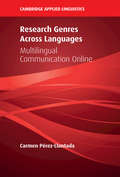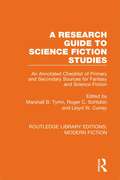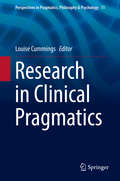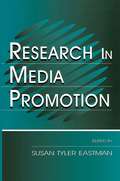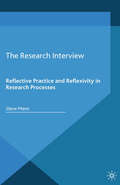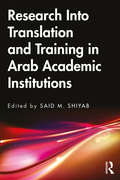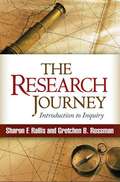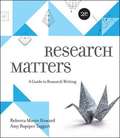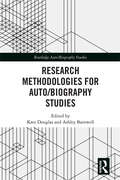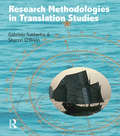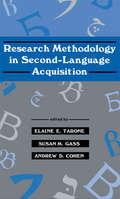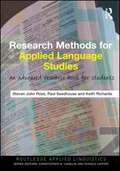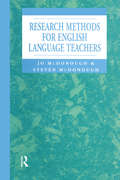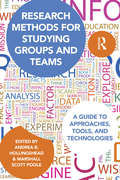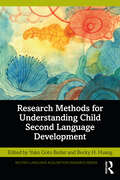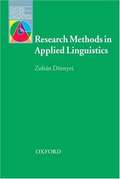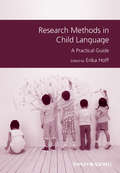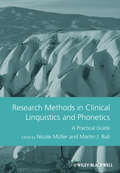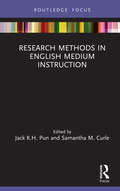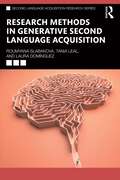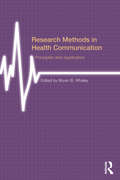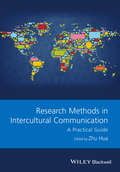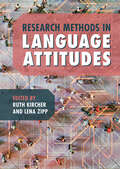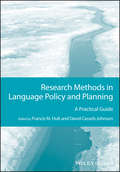- Table View
- List View
Research Genres Across Languages: Multilingual Communication Online (Cambridge Applied Linguistics)
by Carmen Pérez-LlantadaAt present, Web 2.0 technologies are making traditional research genres evolve and form complex genre assemblage with other genres online. This book takes the perspective of genre analysis to provide a timely examination of professional and public communication of science. It gives an updated overview on the increasing diversification of genres for communicating scientific research today by reviewing relevant theories that contribute an understanding of genre evolution and innovation in Web 2.0. The book also offers a much-needed critical enquiry into the dynamics of languages for academic and research communication and reflects on current language-related issues such as academic Englishes, ELF lects, translanguaging, polylanguaging and the multilingualisation of science. Additionally, it complements the critical reflections with data from small-scale specialised corpora and exploratory survey research. The book also includes pedagogical orientations for teaching/training researchers in the STEMM disciplines and proposes several avenues for future enquiry into research genres across languages.
A Research Guide to Science Fiction Studies: An Annotated Checklist of Primary and Secondary Sources for Fantasy and Science Fiction (Routledge Library Editions: Modern Fiction)
by Marshall B. Tymn, Roger C. Schlobin and Lloyd W. CurreyAcademic attention to science fiction and fantasy began in 1958, when the Modern Language Association scheduled its first seminar on science fiction at its New York meeting. Over the years science fiction emerged as a popular subject that achieved critical attention and acceptance as an academic discipline. A Research Guide to Science Fiction Studies, originally published in 1977, is designed to provide the reader – whether they be scholar, teacher, librarian, or fan – with a comprehensive listing of the important research tools that have been published in the United States and England through 1976. The volume contains over 400 selected, annotated entries covering both general and specialized sources, including general surveys, histories, genre studies, author studies, bibliographies, and indices, which span the entire range of science fiction and fantasy scholarship.
Research in Clinical Pragmatics
by Louise CummingsThis is the first volume to present individual chapters on the full range of developmental and acquired pragmatic disorders in children and adults. In chapters that are accessible to students and researchers as well as clinicians, this volume introduces the reader to the different types of pragmatic disorders found in clinical populations as diverse as autism spectrum disorder, traumatic brain injury and right hemisphere language disorder. The volume also moves beyond these well-established populations to include conditions such as congenital visual impairment and non-Alzheimer dementias, in which there are also pragmatic impairments. Through the use of conversational and linguistic data, the reader can see how pragmatic disorders impact on the communication skills of the clients who have them. The assessment and treatment of pragmatic disorders are examined, and chapters also address recent developments in the neuroanatomical and cognitive bases of these disorders.
Research in Media Promotion (Routledge Communication Series)
by Susan Tyler EastmanEastman has assembled this exemplary volume to spotlight media promotion and to examine current research on the promotion of television and radio programs. The studies included here explore various types of promotion and use widely differing methods and approaches, providing a comprehensive overview of promotion research activities. Chapters include extensive literature reviews, original research, and discussion of research questions for subsequent study. Research in Media Promotion serves as a benchmark for the current state of promotion research and theory, and establishes the role of promotion as a primary factor affecting audience size. Appropriate for coursework and study in programming, marketing, research methods, management, and industry processes and practices, this volume offers agenda items for future study and is certain to stimulate new research ideas.
The Research Interview: Reflective Practice and Reflexivity in Research Processes
by S. MannResearch and Qualitative Interviews brings into focus the decisions that the interviewer faces by taking a data-led approach in order to open up choices and decisions in the process of planning for, managing, analysing and representing interviews. The chapters concentrate on the real-time, moment-by-moment nature of interview management and interaction. A key feature of the book is the inclusion of reflexive vignettes that foreground the voices and experience of qualitative researchers (both novices and more expert practitioners). The vignettes demonstrate the importance of reflecting on and learning from interactional experience. In addition, the book provides an overview of different types of interviews, commenting on the orientation and make-up of each type. Overall, this book encourages reflective thinking about the use of research interviews. It distinguishes between reflection, reflective practice and reflexivity. All the chapters focus on recurring choices, dilemmas and puzzles; offering advice in opening out and engaging with these aspects of the research interview.
Research Into Translation and Training in Arab Academic Institutions
by Said M. ShiyabResearch Into Translation and Training in Arab Academic Institutions provides insights into the current issues and challenges facing in-service and trainee Arabic translators and interpreters, both professionally and academically. This book addresses translators’ status, roles, and structures. It also provides Arab perspectives on translation and translation training, written by scholars representing academic institutions across the Arab world. Themes in this collection include training terminologists on managing, promoting and marketing terms; corpora and translation teaching in the Arab world; use of translation technologies; translators training and translators’ methodologies and assessment of translators’ competence; research on translator training; and the status quo of undergraduate translation programs in a sample of five Arab universities. A valuable resource for students, professionals and scholars of Arabic translation and interpreting.
The Research Journey: Introduction to Inquiry
by Sharon Rallis Gretchen Rossman Thomas SchwandtDesigned to foster "inquiry-mindedness," this book prepares graduate students to develop a conceptual framework and conduct inquiry projects that are linked to ongoing conversations in a field. The authors examine different ways of knowing and show how to identify a research question; build arguments and support them with evidence; make informed design decisions; engage in reflective, ethical practices; and produce a written proposal or report. Each chapter opens with a set of critical questions, followed by a dialogue among five fictional graduate students exploring questions and concerns about their own inquiry projects; these issues are revisited throughout the chapter. Other useful features include end-of-chapter learning activities for individual or group use. Useful pedagogical features include: *Framing questions for exploration and reflection. *Chapter-opening dialogues that bring in perspectives from multiple disciplines. *Example boxes with detailed cases and questions for the reader. *End-of-chapter activities and experiential exercises that guide readers to develop their own inquiry projects. *Suggestions for further reading.
Research Matters: A Guide to Research Writing
by Rebecca Moore Howard Amy Rupiper TaggartBy framing writing in the context of responsibility, Research Matters addresses composition students as mature and capable fellow participants in the research and writing process. The second edition includes more information on the author's exciting research findings from the Citation Project which helps students better understand proper sourcing and documentation and how to avoid plagiarism in their research.
Research Methodologies for Auto/biography Studies (Routledge Auto/Biography Studies)
by Kate Douglas Ashley BarnwellThis collection of short essays provides a rigorous, rich, collaborative space in which scholars and practitioners debate the value of different methodological approaches to the study of life narratives and explore a diverse range of interdisciplinary methods. Auto/biography studies has been one of the most vibrant sub-disciplines to emerge in the humanities and social sciences in the past decade, providing significant links between disciplines including literary studies, languages, linguistics, digital humanities, medical humanities, creative writing, history, gender studies, education, sociology, and anthropology. The essays in this collection position auto/biography as a key discipline for modelling interdisciplinary approaches to methodology and ask: what original and important thinking can auto/biography studies bring to discussions of methodology for literary studies and beyond? And how does the diversity of methodological interventions in auto/biography studies build a strong and diverse research discipline? In including some of auto/biography’s leading international scholars alongside emerging scholars, and exploring key subgenres and practices, this collection showcases knowledge about what we do when engaging in auto/biographical research. Research Methodologies for Auto/biography Studies offers a series of case studies that explore the research practices, reflective behaviours, and ethical considerations that inform auto/biographical research.
Research Methodologies for Auto/biography Studies (ISSN)
by Kate Douglas Ashley BarnwellThis collection of short essays provides a rigorous, rich, collaborative space in which scholars and practitioners debate the value of different methodological approaches to the study of life narratives and explore a diverse range of interdisciplinary methods. Auto/biography studies has been one of the most vibrant sub-disciplines to emerge in the humanities and social sciences in the past decade, providing significant links between disciplines including literary studies, languages, linguistics, digital humanities, medical humanities, creative writing, history, gender studies, education, sociology, and anthropology.The essays in this collection position auto/biography as a key discipline for modelling interdisciplinary approaches to methodology and ask: what original and important thinking can auto/biography studies bring to discussions of methodology for literary studies and beyond? And how does the diversity of methodological interventions in auto/biography studies build a strong and diverse research discipline? In including some of auto/biography’s leading international scholars alongside emerging scholars, and exploring key subgenres and practices, this collection showcases knowledge about what we do when engaging in auto/biographical research. Research Methodologies for Auto/biography Studies offers a series of case studies that explore the research practices, reflective behaviours, and ethical considerations that inform auto/biographical research.
Research Methodologies in Translation Studies
by Sharon O'Brien Gabriela SaldanhaAs an interdisciplinary area of research, translation studies attracts students and scholars with a wide range of backgrounds, who then need to face the challenge of accounting for a complex object of enquiry that does not adapt itself well to traditional methods in other fields of investigation. This book addresses the needs of such scholars – whether they are students doing research at postgraduate level or more experienced researchers who want to familiarize themselves with methods outside their current field of expertise. The book promotes a discerning and critical approach to scholarly investigation by providing the reader not only with the know-how but also with insights into how new questions can be fruitfully explored through the coherent integration of different methods of research. Understanding core principles of reliability, validity and ethics is essential for any researcher no matter what methodology they adopt, and a whole chapter is therefore devoted to these issues. Research Methodologies in Translation Studies is divided into four different chapters, according to whether the research focuses on the translation product, the process of translation, the participants involved or the context in which translation takes place. An introductory chapter discusses issues of reliability, credibility, validity and ethics. The impact of our research depends not only on its quality but also on successful dissemination, and the final chapter therefore deals with what is also generally the final stage of the research process: producing a research report.
Research Methodology in Second-Language Acquisition (Second Language Acquisition Research Series)
by Elaine E. Tarone Susan M. Gass Andrew D. CohenThis volume addresses salient theoretical issues concerning the validity of research methods in second-language acquisition, and provides critical analysis of contextualized versus sentence-level production approaches. The contributors present their views of competence versus performance, the nature of language acquisition data, research design, the relevance of contextualized data collection and interpretation, and the desirability of a particularistic nomothetic theoretical paradigm versus more comprehensive consideration of multiple realities and complex influencing factors. This book presents varying and antithetical approaches to the issues, bringing together the thinking and approaches of leading researchers in language acquisition, language education, and sociolinguistics in an engaging debate of great currency in the field.
Research Methods for Applied Language Studies: An Advanced Resource Book for Students
by Steven John Ross Paul Seedhouse Keith RichardsRoutledge Applied Linguistics is a series of comprehensive textbooks, providing students and researchers with the support they need for advanced study in the core areas of English language and Applied Linguistics. Each book in the series guides readers through three main sections, enabling them to explore and develop major themes within the discipline. Section A, Introduction, establishes the key terms and concepts and extends readers' techniques of analysis through practical application. Section B, Extension, brings together influential articles, sets them in context, and discusses their contribution to the field. Section C, Exploration, builds on knowledge gained in the first two sections, setting thoughtful tasks around further illustrative material. This enables readers to engage more actively with the subject matter and encourages them to develop their own research responses. Throughout the book, topics are revisited, extended, interwoven and deconstructed, with the reader's understanding strengthened by tasks and follow-up questions. Research Methods for Applied Language Studies: Provides an advanced introduction to quantitative and qualitative research methods used in second and foreign language learning, teaching and assessment Takes readers step by step through the processes of research, from formulating research questions to writing up a dissertation or report. Employs a wide variety of carefully structured tasks and discussion points to guide the reader through the key themes, frameworks and procedures of applied language research, including ethnography, conversation analysis and quasi-experimental designs. Engages students in readings and tasks on articles from leading names in the field, including Alison Mackey, Roy Lyster, Angela Creese, Junko Mori, Rod Ellis and Diane Larsen-Freeman. Is supported by a Companion Website, including data sets for practice and guides to writing a proposal, making recordings, conducting interviews, producing questionnaires and organising a dissertation. Written by experienced teachers and researchers in the field, Research Methods for Applied Language Studies is an essential resource for students and researchers of Applied Linguistics.
Research Methods for English Language Teachers
by Jo McDonough Steven McDonoughThis book offers a lively introduction to the research methods and techniques available to English language teachers who wish to investigate aspects of their own practice. It covers qualitative and quantitative methodology and includes sections on observation, introspection, diary studies, experiments, interviews, questionnaires, numerical techniques and case study research.Each method is illustrated with examples in language teaching contexts, and techniques of data collection and analysis are introduced. The authors focus particularly on research in the classroom, on tests, materials, the effects of innovations, and they discuss methods appropriate to research in various collaborative modes as well as by individuals. A key feature of the book is an introduction to the debate surrounding different approaches to research, with an evaluation of traditional research in relation to the paradigms associated with reflective practice and action research.The book is ideal for teachers on initial training and post-experience courses, students on degree programmes in applied linguistics and TEFL and, of course, practising teachers with an interest in research methods in language teaching.
Research Methods for Studying Groups and Teams: A Guide to Approaches, Tools, and Technologies (Routledge Communication Series)
by Andrea B. Hollingshead Marshall Scott PooleThis volume provides an overview of the methodological issues and challenges inherent in the study of small groups from the perspective of seasoned researchers in communication, psychology and other fields in the behavioral and social sciences. It summarizes the current state of group methods in a format that is readable, insightful, and useful for both new and experienced group researchers. This collection of essays will inspire new and established researchers alike to look beyond their current methodological approaches, covering both traditional and new methods for studying groups and exploring the full range of groups in face-to-face and online settings. The volume will be an important addition to graduate study on group research and will be a valuable reference for established group researchers, consultants and other practitioners. The essays in this volume when considered as a whole will be a contemporary interdisciplinary integration on group research methods.
Research Methods for Understanding Child Second Language Development (Second Language Acquisition Research Series)
by Butler, Yuko Goto and Huang, Becky H.Butler and Huang’s book is one of the first to focus on second language (L2) development research methods and techniques specifically targeted at children of primary and pre-primary years. The last decade has seen a growing number of L2 studies of children aged 4–12, a demographic with special developmental characteristics that confound research methods designed for studying adults. Written by experts from a variety of disciplines, this book covers major research methods and techniques in existing L2 development research, including observations, surveys, interviews, introspective methods, speech production methods, receptive methods, eye tracking, and brain imaging, as well as research methods specifically designed for L2 children with special educational needs. The book also discusses various age-related considerations and challenges if they are employed to young L2 learners. This will be essential reading for SLA, child development, and TESOL researchers, and students in these courses will benefit particularly from pedagogical material such as further readings and discussion questions.
Research Methods in Applied Linguistics
by Zoltan DörnyeiA comprehensive overview of research methodology in applied linguistics which describes the various stages of qualitative and quantitative investigations, from collecting the data to reporting the results.
Research Methods in Child Language: A Practical Guide (Guides to Research Methods in Language and Linguistics #9)
by Erika HoffThis is a comprehensive and accessible guide to the methods researchers use to study child language, written by experienced scholars in the study of language development. Presents a comprehensive survey of laboratory and naturalistic techniques used in the study of different domains of language, age ranges, and populations, and explains the questions addressed by each technique Presents new research methods, such as the use of functional Near Infrared Spectroscopy (fNIRS) to study the activity of the brain Expands on more traditional research methods such as collection, transcription, and coding of speech samples that have been transformed by new hardware and software
Research Methods in Clinical Linguistics and Phonetics
by Martin J. Ball Nicole MüllerThe only volume to offer hands-on information about the wide range of research philosophies, methods and tools used across linguistics, phonetics, and speech science, as applied to disordered speech and language.* Covers core topics for students undertaking their own research, including experimental and qualitative methods, sociolinguistics, corpus construction and analysis, data recording, transcription and digital analysis of speech, and speech imaging.* Considers the research ethics associated with working with people who have speech, language or other communication difficulties.* Includes a detailed discussion of the dissemination of research results, and advice on the writing of theses and dissertations, and on the writing and publishing of journal articles, as well the peer review process.* Offers students and researchers from a variety of entry points - such as linguistics, education, psychology, and speech pathology - an introduction to the scope of research in clinical linguistics and phonetics, and a practical guide to this interdisciplinary field
Research Methods in English Medium Instruction (Routledge Research in Higher Education)
by Jack K.H. Pun; Samantha M. CurleIn this special edited volume, the editors and invited English Medium Instruction (EMI) researchers, from different parts of the world, outline the latest EMI research methods. Providing academic instruction using English is rapidly spreading in many countries where English is a second or foreign language, and there is a growing interest in researching the effectiveness and effects of EMI across different educational levels. This volume includes chapters on everything from research into classroom interaction to teachers’ and students’ perceptions and motivations to language challenges and strategies and the pedagogical implications of translanguaging in EMI classrooms. These specific topics were chosen to reflect different approaches to researching EMI. Each chapter focuses on a specific type of research methodology. It begins with an overview of the literature of the topic under discussion. Then an example study is provided to illustrate how this methodology can be used to investigate EMI. Each chapter identifies the process that the EMI researcher used to conduct their research and discusses key dilemmas they faced, focusing particularly on the methodological issues they encountered. By exploring these issues, this volume hopes to inform theory (or the lack thereof) underlying research into the phenomenon of EMI. This volume is indispensable for EMI tutors, curriculum developers, policymakers, and teachers, as well as students at both undergraduate and postgraduate levels. It is particularly valuable for researchers from across the globe working in the fields of applied linguistics, language education, English for Academic Purposes (EAP), English Language Teaching (ELT), and Teaching English to Speakers of Other Languages (TESOL).
Research Methods in Generative Second Language Acquisition (ISSN)
by Roumyana Slabakova Tania Leal Laura DomínguezThis timely text provides a comprehensive overview of the research methods used by the Generative Second Language Acquisition framework.The authors lay out the history and state of the art in the field, explain the theoretical underpinnings of this work, and offer practical hands-on guidance for developing, conducting and understanding studies related to L2 grammatical competence—using a rich array of techniques and advancing key insights into the rationale and circumstantial pros and cons of each method.With useful features in a consistent chapter structure, including diverse case studies and discussion questions, the book will be an invaluable resource to students and researchers of SLA, applied linguistics, theoretical linguistics, education, and related areas.
Research Methods in Health Communication: Principles and Application
by Bryan B. WhaleyThis volume provides an essential roster of primary research methods as they apply to health communication inquiry. Editor Bryan B. Whaley brings together key health communication researchers to write about their primary methodological areas. Their chapters offer guidance and insights for a variety of approaches to answering research questions. The methods included here cover: Exploration and Description: interview/focus groups, case study, ethnography, and surveys; Examining Messages and Interpersonal Exchanges: narrative analysis, conversational analysis, analyzing physician-patient interactions, social network analysis, and content analysis; Causal Explication: experimental research, meta-analysis, and meta-synthesis; and Cultural, Population, and Critical Concerns: rhetorical methods and criticism, and methodological issues when investigating stigmatized populations, and groups with health disparities. Chapters cite or use examples from allied health areas -- nursing, public health, sociology, medicine -- to demonstrate the breadth of health communication studies. This work highlights the importance of methodology in health communication research in multiple contexts. Developed to provide a fundamental reference for investigating health communication, this volume will serve as an invaluable tool for researchers and students across the social science and health disciplines.
Research Methods in Intercultural Communication: A Practical Guide (Guides to Research Methods in Language and Linguistics)
by Zhu HuaResearch Methods in Intercultural Communication introduces and contextualizes the most important methodological issues in the field for upper-level undergraduate and graduate students. Examples of these issues are which paradigms and how to research multilingually, interculturally and ethnically. Provides the first dedicated and most comprehensive volume on research methods in intercultural communication research in the last 30 years Explains new and emerging methods, as well as more established ones. These include: Matched Guise Technique, Discourse Completion Task, Critical Incident Technique, Critical Discourse Analysis, Ethnography, Virtual Ethnography, Corpus Analysis, Multimodality, Conversation Analysis, Narrative Analysis, Questionnaire and Interview. Assists readers in determining the most suitable method for various research questions, conceptualizing the research process, interpreting results, and drawing conclusions Supports students from start to finish with key terms, suggestions for further reading, research summaries, and sound guidance from experienced scholars and researchers
Research Methods in Language Attitudes
by Ruth Kircher Lena ZippAttitudes towards spoken and written language are of significant interest to researchers in sociolinguistics, applied linguistics, communication studies, and social psychology. This is the first interdisciplinary guide to traditional and cutting-edge methods for the investigation of language attitudes. Written by experts in the field, it provides an introduction to attitude theory, helps readers choose an appropriate method, and guides through research planning and design, data collection, and analysis. Chapters include step-by-step instructions to illustrate and facilitate the use of the different methods as well as case studies from a wide range of linguistic contexts. The book also goes beyond individual methods by offering guidance on how to research attitudes in multilingual and signing communities, based on historical data, with the help of priming, and by means of mixed-methods approaches.
Research Methods in Language Policy and Planning: A Practical Guide (Guides to Research Methods in Language and Linguistics #6)
by Francis M. Hult David Cassels JohnsonThis is the first volume exclusively devoted to research methods in language policy and planning (LPP). Each chapter is written by a leading language policy expert and provides a how-to guide to planning studies as well as gathering and analyzing data Covers a broad range of methods, making it easily accessible to and useful for transdisciplinary researchers working with language policy in any capacity Will serve as both a foundational methods text for graduate students and novice researchers, and a useful methodological reference for experienced LPP researchers Includes a series of guidelines for public engagement to assist scholars as they endeavor to incorporate their work into the public policy process
